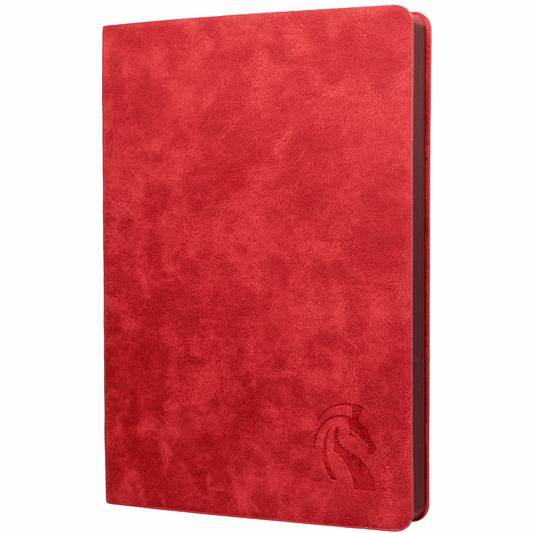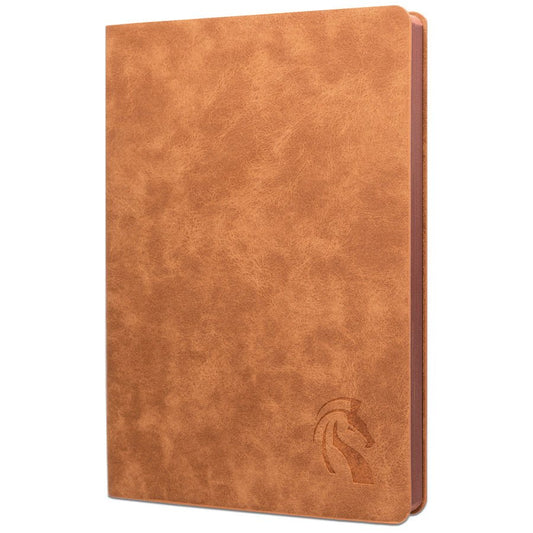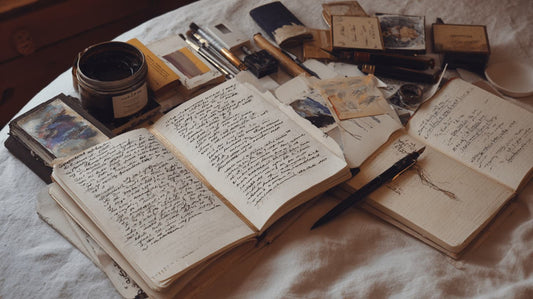
On any given day, how many people, events, problems, projects, family issues, things to remember and appointments are running through your mind? A LOT, right? If you're writing a book, you have to add on top of that a whole other world of characters, events, settings, plots, (if you're writing fiction) or stories, bullet points, theories and rhetoric (if you're writing non-fiction). How do you keep track of it all?
Keeping a journal for your book can be a great tool. In it you can keep your outline, character details, plotting charts and anything else that serves as a guide for helping you stay on track.
The following IS a simple outline of headings for setting up your daily journal pages to help you with the day-to-day writing of your book. Word Goal
At the top of your page start out with the date of the writing session and set a goal for how many words you will write for the day. Make the number big enough to challenge you, but not too big that you feel overwhelmed if you consistently miss it.
You can also keep the word goal in line with what you're working on that day. If you are re-writing a chapter instead of creating a new one, then your word count for the day will be significantly smaller. (And that's okay!) Today's Work Will Focus On...
Under this heading you will plan out what you want to handle in the session. Are you writing a dialogue where your main character learns someone's innermost secrets? Are you doing a scene setter that places the reader in the heart of your book? Are you writing a how-to chapter to explain how the reader can put to use the new strategies you've given them on how to be a better networker? Doing this also makes the word goal less intimidating because you immediately see what you're going to do with all those words! What Problems Might I Encounter?
There WILL be problems--no big deal. Note what they may be so you won't get tangled up in the problem as you're sitting in front of the computer screen. Write down each one.

Some examples: "How do I get my character to go from living at home to a place nearer to where all the action is happening?" "How do I introduce the character to the guy who will ruin her life?" "How do I shrink my program down to 5 simple steps that people can remember?"
Acknowledging problems really helps to lessen their power over your writing. You aren't scared away from a problem so easily when you know you can come up with a solution. Possible Solutions Include...
This is where you'll do a quick brainstorming of how you can solve the problem. You can try out one of the solutions in your writing session. If that doesn't work, you'll have a list of things you can try the next day.
What's great about this is that you're starting to train your mind to look for answers. You'll find that when you're writing consistently, you'll be thinking about ideas and solutions all the time--in your car, in the shower, while you're taking a walk.
This is really where the magic happens. I truly believe that the bulk of books can be worked out in your head--then you have to sit down and get it onto some paper! Today's Result and Where It Will Take Me Tomorrow...
At the end of your writing for the day you'll want to take note of what you accomplished. Maybe the dialogue you wrote today has opened up another avenue you'd like to explore with your character.
Or perhaps you've noticed a big hole in the research you've done for the biography you're writing and you realize you need to make a few more calls. like to print out the pages I've written so I can really see and feel what I've done for the day.
It makes me excited to do more. The idea here is to reward yourself for your work and also see that you have more to do. You're less likely to get writer's block if you see that you still have plenty more to say for your next session. But if you do happen to get stuck anyway, go to...Your Fun Page!
This is the page where you just dawdle and dream when the writing isn't quite happening. had a page with "Acknowledgments" written at the top.
Whenever I didn't feel like writing, would go to this page and think about who I wanted to thank when the book was finished! It was fun to add names or cross them out depending on my mood! Having such a page helped me stay connected to my vision of being a published author.
Your page could have the list of cities for your book tour, or notes on the introduction you would give before your readings.
Keep it light, keep it fun. This way, getting to the end of your book will be a pleasure, not a struggle. Isn't that the way you want it to be?

Start Journaling With LeStallion Premium Journals
LeStallion Soft Cover PU Leather Journals inspires and excites you to write more, allow you to further grow and develop, so you may achieve your goals and dreams!
SEE THIS JOURNAL













